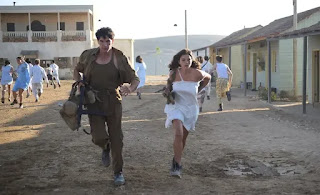In 1948, not long after the state of Israel declared independence, fighting began between Israelis and their incensed Arab neighbors. One of those battles took place in southern Israel at Kibbutz Nitzanim.
The story of that battle and the people who fought it unfolds in Image of Victory, reported to be the the most expensive Israeli film ever made.
The movie begins with Egypt and Israel signing a peace agreement in 1979. An Egyptian journalist (Amir Khoury) who covered the events of 1948 wonders how the world could have changed so much. Did the Egyptians who died in those early days of war sacrifice their lives for nothing?
Khoury's Hassanin remembers the fighting at Nitzanim as he recalls the face of a smiling Israeli woman who, after all had been lost at Nitzanim, faced the Egyptians with only a pistol in her hand. Mira Ben Ari (Joy Rieger), a young mother, fought to protect the kibbutz when she could have fled with other evacuees.
Director Avi Nesher situates the story in a frontier outpost in a lawless bit of land where the kibbutz residents are mostly left to their own devices, trying to survive, worrying about hostile neighbors, and sometimes squabbling among themselves.
The father of Mira's child (Elisha Banai) wants a more traditional relationship than Mira is willing to accept. Avraham (Ladin Gellman) tries to lead a small group of untrained soldiers (some ex-convicts) while clinging to a sense of military discipline.
Presented in flashback from its opening scenes in 1979, the story tells us that Hassanin was supposed to be making a propaganda film, photographing the victorious Egyptian army. He didn't always show the Egyptian efforts in the best light and found himself at odds with Egyptian officials and with Lieutenant Half (Alaa Dakka), a soldier who had no use for even a small film crew.
Overall, the Israelis beat the Egyptian and Arab forces but Egypt's King Faruk, hungry for at least one victory, dispatched a large force against the kibbutz, where a handful of desperate fighters remained after the collective farm had been evacuated.
Based on real events, Image of Victory doesn't totally embrace both sides of the conflict but Nesher creates what feels like a realistic portrait of newly arrived Jews living in a struggling young country.
Outnumbered and outgunned, the Israelis who remained at Nitzanim ultimately surrendered but the movie's strength derives from its suggestion that both Israelis and Egyptians were caught in an impossible situation.

No comments:
Post a Comment